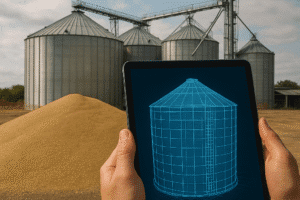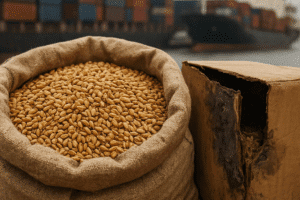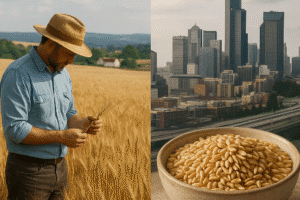The impact of biofuels on global grain supply is a complex and multifaceted issue that has garnered significant attention in recent years. As the world seeks sustainable energy sources to combat climate change, the demand for biofuels has surged, leading to increased competition for agricultural resources. This article explores the intricate relationship between biofuels and grain supply, examining both the positive and negative effects on food security, agricultural practices, and global markets.
Understanding Biofuels and Their Production
Biofuels are renewable energy sources derived from organic materials, primarily plants. They are produced through various processes, including fermentation, transesterification, and anaerobic digestion. The most common types of biofuels include bioethanol, biodiesel, and biogas. Bioethanol is typically produced from sugarcane, corn, and other starchy crops, while biodiesel is made from vegetable oils and animal fats. The production of these fuels often requires significant agricultural inputs, which can directly impact grain supply.
The rise of biofuels can be attributed to several factors, including government policies promoting renewable energy, technological advancements in biofuel production, and growing consumer demand for sustainable energy sources. In many countries, biofuels are seen as a viable alternative to fossil fuels, contributing to energy security and reducing greenhouse gas emissions. However, the increasing demand for biofuels has raised concerns about their impact on food production and prices.
The Impact of Biofuels on Grain Supply
The relationship between biofuels and grain supply is characterized by both competition and interdependence. On one hand, the production of biofuels can lead to increased demand for certain grains, particularly corn and sugarcane. This heightened demand can drive up prices, making it more challenging for consumers to access affordable food. On the other hand, the agricultural sector can benefit from the biofuel industry through increased investment and innovation.
Competition for Resources
One of the most significant concerns regarding biofuels is the competition for land, water, and other resources between food and fuel production. As farmers allocate more land to grow biofuel crops, the availability of land for food production may decrease. This shift can lead to a reduction in the overall grain supply, particularly in regions where agricultural land is limited.
- Land Use Changes: The conversion of agricultural land for biofuel production can result in deforestation and habitat loss, further exacerbating environmental issues.
- Water Scarcity: Biofuel crops often require substantial water resources, which can strain local water supplies and impact food production.
- Soil Degradation: Intensive farming practices associated with biofuel production can lead to soil degradation, reducing the land’s long-term productivity.
Price Volatility and Food Security
The increased demand for grains for biofuel production can lead to price volatility in global grain markets. When grain prices rise due to biofuel demand, it can have a cascading effect on food prices, particularly in developing countries where consumers spend a larger portion of their income on food. This situation can exacerbate food insecurity and malnutrition, particularly among vulnerable populations.
Moreover, the reliance on biofuels can create a feedback loop where high food prices lead to increased calls for biofuel production, further driving up prices. This cycle can destabilize local economies and create social unrest, particularly in regions heavily dependent on agriculture.
Potential Benefits of Biofuels
Despite the challenges posed by biofuels, there are potential benefits that can arise from their production and use. These benefits can contribute to a more sustainable agricultural system and enhance food security in the long run.
Investment in Agricultural Innovation
The biofuel industry has spurred investment in agricultural research and development, leading to innovations that can improve crop yields and sustainability. For example, advancements in biotechnology have enabled the development of drought-resistant and pest-resistant crop varieties, which can help farmers adapt to changing climate conditions.
- Improved Crop Varieties: The development of genetically modified organisms (GMOs) can lead to higher yields and reduced reliance on chemical inputs.
- Precision Agriculture: Technologies such as satellite imagery and data analytics can help farmers optimize their resource use, reducing waste and increasing efficiency.
- Agroecological Practices: The integration of biofuel production with sustainable farming practices can enhance soil health and biodiversity.
Economic Opportunities
The biofuel industry can create economic opportunities for farmers and rural communities. By diversifying their income sources, farmers can reduce their vulnerability to market fluctuations and improve their livelihoods. Additionally, the growth of the biofuel sector can lead to job creation in areas such as processing, transportation, and distribution.
Furthermore, biofuels can contribute to energy independence, reducing reliance on imported fossil fuels and enhancing national energy security. This shift can have positive implications for local economies, as it keeps energy spending within the community.
Policy Considerations and Future Directions
As the global demand for biofuels continues to grow, policymakers must carefully consider the implications for grain supply and food security. A balanced approach is needed to ensure that biofuel production does not come at the expense of food availability and affordability.
Regulatory Frameworks
Governments play a crucial role in shaping the biofuel industry through regulations and incentives. Policies that promote sustainable biofuel production can help mitigate the negative impacts on grain supply. For example, regulations that encourage the use of waste materials and non-food crops for biofuel production can reduce competition for food resources.
- Incentives for Sustainable Practices: Providing financial support for farmers who adopt sustainable farming practices can help balance food and fuel production.
- Research and Development Funding: Investing in research to develop alternative biofuel sources, such as algae or agricultural residues, can reduce pressure on food crops.
- International Cooperation: Collaborative efforts among countries can help address the global challenges posed by biofuels and ensure food security for all.
Future Trends in Biofuel Production
The future of biofuels will likely be shaped by technological advancements and changing consumer preferences. As the industry evolves, there may be a shift towards more sustainable and efficient biofuel production methods. Innovations such as cellulosic ethanol, which uses non-food plant materials, hold promise for reducing competition with food crops.
Additionally, the growing awareness of climate change and environmental sustainability may drive consumers to seek out more eco-friendly energy sources, influencing the direction of the biofuel market. This shift could lead to a more integrated approach to energy and food production, where both sectors work in harmony to support global sustainability goals.
Conclusion
The relationship between biofuels and global grain supply is complex and requires careful consideration of various factors. While biofuels present opportunities for sustainable energy production and economic growth, they also pose challenges to food security and agricultural practices. A balanced approach that prioritizes both energy needs and food availability is essential for ensuring a sustainable future. By fostering innovation, implementing supportive policies, and promoting sustainable practices, it is possible to navigate the challenges posed by biofuels while enhancing global grain supply and food security.













